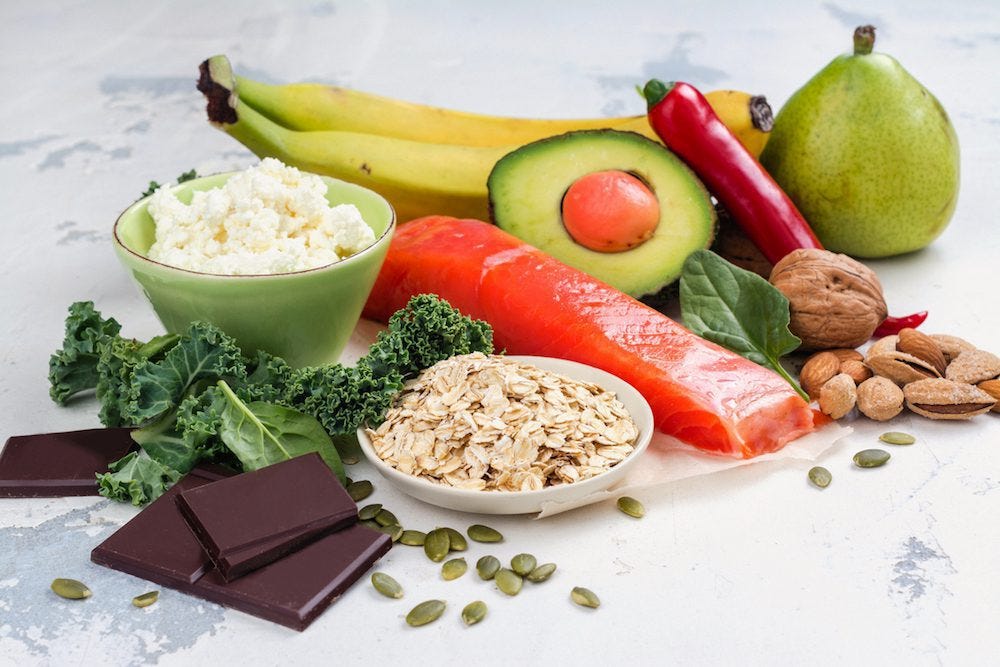7 of the Best Ways to Naturally Increase Dopamine
Does it feel like you never have enough energy?
Do you find it hard to concentrate?
Have you lost your zest for life?
If you answered yes to any of these, your neurotransmitters may be out of balance.
What Are Neurotransmitters?
Neurotransmitters (or transmitters) are small molecules that communicate information between neurons or other brain cells, both within your brain and to and from the rest of your body. Most typically, a nerve cell, when electrically stimulated, releases transmitters that travel to other cells and bind with sensors on those cells (receptors) that turn those cells on or off.
Transmitters influence and regulate the functioning of practically every cell, tissue, and organ in your body. While the exact number isn’t known, the human body has at least 60 different transmitters.
Since the body’s transmitter systems are also intricately involved with its hormone systems, neurotransmitter imbalances can cause serious health problems.
Balanced Brain Transmitters
Transmitters coordinate and regulate every feature of your mind and body. More important than the activity of any one transmitter system is the overall balance between all the systems in the brain.
When your brain transmitters are balanced, you may think more clearly, feel happier, and experience greater well-being. But when your transmitters are out of balance, you may experience difficulties in every area of your life.
Proper neurotransmitter system balance is essential for living a brain-healthy life. The better your transmitters work with each other, the closer you’ll be to having optimal mental function. Transmitters such as acetylcholine, serotonin‚ norepinephrine, glutamate, dopamine‚ and GABA play key roles in optimal brain functioning‚ which is essential to healthy behaviors and decision-making.
What is Dopamine?
Dopamine is the main neurotransmitter responsible for making you feel motivated. In fact, it’s often called the “motivation molecule.”
Dopamine provides the drive and focus you need to be productive. It’s heavily involved with your attention span, focus, follow-through, motivation, and ability to experience pleasure. Dopamine helps deliver a sense of satisfaction when playing sports, learning something new, accomplishing a task or project, or getting a promotion at work.
Dangers of the “Dopamine Fix”
There are both healthy and unhealthy ways to get a dopamine fix. Unfortunately, many of the things people do to boost their focus and energy end up backfiring, as dopamine overactivation increases risk for addiction.
Anything potentially addicting, like nicotine, excessive caffeine, alcohol/drugs, or sugar-laden/fat-filled treats, can increase brain dopamine activity and cause compulsive behaviors in your life.
These unhealthy ways of getting a quick dopamine boost tend to increase the brain’s demand for dopamine. This can hinder the brain’s natural function, which can result in a disruption of the natural dopamine production process and low dopamine system activity in the long-term.
Signs of Dopamine System Imbalance
Having a dopamine system imbalance can cause significant functional issues in your brain. Underactivity of dopamine can be associated with:
- Fatigue
- Apathy
- Lack of focus
- Forgetfulness
- Moodiness
- Sleep issues
- Sugar cravings
- Lower motivation
- Poor motor control
Fortunately, there are also healthy ways to balance your brain’s dopamine system. Here are some of the best ways to support healthy dopamine activity in your brain with vitamins, minerals, herbs, and other natural ingredients…
7 Healthy Nutrients to Help Naturally Increase Dopamine in Your Brain

Cocoa Flavanols
Chocolate is made from the beans that mature in the seed pods of the tropical Theobroma cacao plant. For centuries, dark chocolate has been honored for its healing and medicinal qualities.
Aztecs and ancient Mayans even drank theirs in a brew made from natural cacao beans; they believed it provided strength and energy. When the Europeans first brought cacao home from the Americas, they used it as an all-purpose tonic to treat dozens of health conditions. Some Europeans referred to chocolate as “the food of the gods.”
Chocolate has been shown to increase blood flow to the brain. Also, dark chocolate contains health-promoting properties that support a positive mood, the ability to think clearly, and a healthy cardiovascular system.
Chocolate contains a wide variety of brain-active substances, including salsolinol, which binds to dopamine receptors and likely contributes to the mood-enhancing effects. Chocolate also contains the amino acid l-tryptophan, which can be converted to serotonin (the “don’t worry, be happy” neurotransmitter) activity in your brain.
Curcumin
Curcumin is an umbrella name for the three main active curcuminoids of turmeric known to improve health: curcumin, demethoxy-curcumin and bis-demethoxycurcumin. Each brand of curcumin concentrate prepared from the turmeric root has a different ratio of these three curcuminoids.
Modern science has extensively researched the curcumin complex of curcuminoids and established their powerful antioxidant and inflammatory response benefits. Curcumin brands have a myriad of clinically proven actions, including benefits to memory and mood.
Animal studies suggest curcumin’s mood benefits may be linked to dopamine elevation, perhaps also with elevation of serotonin and norepinephrine activity (single transmitters rarely affect complex brain functions such as mood on their own). In addition to supporting the brain, curcumin has been shown to help the eyes, heart and circulation, joints, intestinal tract, skin, prostate, muscles, nerves, and numerous other human tissues.
Magnesium
Sometimes called the relaxation mineral, magnesium is necessary for all our cells to make and use energy. It maintains our DNA and gene structure and is required for more than 300 energy-processing enzymes in the body. Sadly, surveys consistently find at least 1 in 2 Americans may be deficient in magnesium.
This powerful nutrient helps to regulate blood sugar, blood pressure, and maintain normal heart rhythm and blood flow. Magnesium supports electrical activity in the brain and aids the brain’s ability to process information. Magnesium is fundamental to the functioning of the brain’s trillions of synapses, the connections between neurons and other cells where dopamine and virtually all the other transmitters released from one cell influence a “downstream” cell.
Magnesium helps promote memory, positivity, and quality sleep. It’s used by the body for healthy aging, digestive efficiency, to prevent calcium overload, and to strengthen the immune system as an antioxidant. For those with weight challenges, kidney stones, or heart problems, this nutrient can help promote a healthier well-being.
Tyrosine
Tyrosine is an amino acid required to produce three major brain neurotransmitters: dopamine, epinephrine, and norepinephrine.
Your adrenal glands, located on top of your kidneys, work with your brain to manage stress. These glands also utilize tyrosine to produce more of these key brain neurotransmitters. Your body uses tyrosine to create chemical messengers that can help conditions that start in the brain, including low mood and prolonged fatigue.
Vitamin D
Vitamin D is best known for building bones. However, this highly potent vitamin is essential for overall brain and body health. Vitamin D function involves regulating the brain and other organs and may be involved in the healthy regulation of as many as 900 human genes.
Vitamin D is actually a hormone builder. Once made in the skin or taken as a supplement, it becomes converted by the liver and kidney into a hormone (“secosteroid”) that’s so important to health that its receptors are found throughout the brain and practically all our tissues.
Vitamin D plays a critical role in the brain’s early development, its ongoing maintenance, and in its functions that underlie healthy mood and many of the most basic cognitive functions including learning and making memories. Vitamin D promotes the actions of serotonin, dopamine, and other key brain neurotransmitters.
Optimal vitamin D levels promote positive mood, support your overall brain function, and generally improve your well-being. Sadly, vitamin D deficiency is currently epidemic worldwide: CDC reports more than 9 in 10 Americans aren’t getting enough of it from their foods.
Fish Oil
Omega-3 fatty acids are vital for our brain cells – and all our cells – to make the energy they need to function. EPA (eicosapentaenoic acid) and DHA (docosahexaenoic acid) fatty acids are essential to the functioning of all our 30 trillion cells. They’re building blocks for the membrane systems that do most of the heavy lifting for our cells.
We require premade EPA+DHA from our diet. Unfortunately, the modern diet has an unhealthy balance of fatty acids: we get an abundance of saturated and omega-6 fatty acids and not nearly enough omega-3s. Also, most of the omega-3s we do get must be converted to EPA+DHA, which the body doesn’t do effectively.
Numerous surveys indicate populations that don’t consume adequate amounts of seafood (such as the U.S.) don’t get sufficient supplies of EPA and DHA from their diet. Since plant foods don’t supply them, the main dietary sources of EPA and DHA are cold-water fish and dietary supplements. Considering the widespread contamination of seafood by mercury and other toxins, many experts advise that taking a purified fish oil supplement could be a smart choice.
Omega-3 DHA is absolutely crucial for the brain’s synapses to work. The routine actions of dopamine and other major transmitters hinge on there being sufficient DHA in the nerve cell membranes that make the synapse junction.
Panax Ginseng
One of the most popular medicinal substances in the world, ginseng is a root that contains naturally occurring ginsenosides. These play a role in improving focus, sharpening memory, and supporting overall well-being. Ginseng promotes the release of nitric oxide, a very small molecule but a very important transmitter, which opens blood vessels and improves blood flow to the brain and muscles.
Panax ginseng, also known as Asian ginseng, is a potent adaptogen. It’s the best-studied of the ginsengs and leads all other ginsengs for its almost immediate mental focus benefits. Animal studies indicate it has numerous beneficial actions in the brain, one of which involves increasing the activity of the dopamine system.
Maintaining healthy lifestyle habits, such as daily exercise, consuming whole foods, and taking dietary supplements, can help keep your brain transmitters balanced. Having a balanced brain can lead to a balanced life, so support healthy dopamine activity with these natural ingredients.
At BrainMD, we’re dedicated to providing the highest purity nutrients and standardized herbal ingredients to support your energy, focus and overall well-being. For more information about our full list of supplements, please visit us at BrainMD.




What are the recommended doses of these supplements?
Thank you for reaching out! Most of our supplements come with the recommended daily dosage on the bottle depending on which supplement you are interested in trying. We also offer free 7-day trial packs on a select few of our supplements, including Serotonin Mood Support that you can view here: https://brainmd.com/free-trial
I was hoping for brain scans or some other indicator that the foods listed actually do increase dopamine. Do you have any evidence – or do you just write articles?
Thank you for your comment! Yes, we’d love to share with you some of our real patient testimonials. Most of our patients have nutritional guidelines to follow as part of their treatment plan. You can view these stories and testimonials over on the Amen Clinics site. Here is a link to view some of those testimonials with our scan patients: https://www.amenclinics.com/testimonial/
I love the supplements but my concern is do I need to take the same dosage as my husband, my BMI is 22 and his is 29.. He is 6ft and I’m just 5’2 inches. I bought Neurolink and the daily essential bundles (omega3,neurovite,brain and memory boost). I’m afraid to overdose myself.